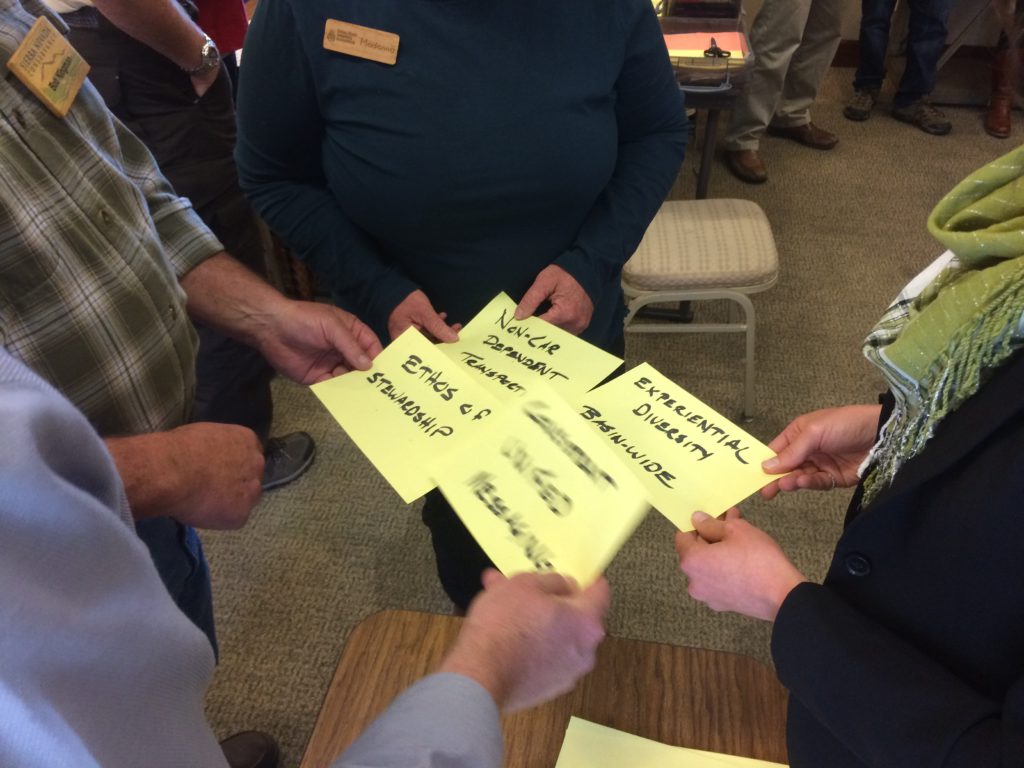Sustainable Recreation
Formed in 2017, the Lake Tahoe Sustainable Recreation Working Group is a multi-sector working group of conservation and recreation professionals, private and nonprofit partners, and recreation stakeholders. The primary goal, and ultimate desired outcome is to provide high-quality outdoor recreation experiences, while preserving and restoring the outstanding natural and cultural resources of the Lake Tahoe Basin.
Working Group Members
- United States Forest Service, Lake Tahoe Basin Management Unit
- Tahoe Regional Planning Agency
- California State Parks
- Nevada Division of State Lands/Nevada State Parks
- City of South Lake Tahoe
- Tahoe City Public Utility District
- California Tahoe Conservancy
- Lake Tahoe South Shore Chamber of Commerce
- Lake Tahoe Visitors Authority
- North Lake Tahoe Resort Association
- League to Save Lake Tahoe
- Tahoe Fund
- Squaw Valley/Alpine Meadows
Vision:
Connect people to Lake Tahoe
Mission:
Provide high-quality outdoor recreation experiences, while preserving and restoring the outstanding natural and cultural resources of the Lake Tahoe Basin.
Sustainable Recreation Values:
Shared Leadership: All are invited to be stewards of Lake Tahoe and collectively create a more sustainable recreation future. Collaboration drives equitable access, quality experiences, and environmental preservation across the Region.
Access for All: Equitable and inclusive access is prioritized ensuring all people can enjoy the natural beauty of Lake Tahoe. Partners promote projects and programs to increase public access and offer a diverse set of recreation experiences for all.
Quality Experience: Recreation experiences are thoughtfully planned, and a diverse set of recreation opportunities and experiences are provided. Quality experience is driven by diversity, quality, and uniqueness and supports local business and community.
Respect Communities: Outdoor recreation and visitation are balanced with community needs. Tahoe culture is preserved as a key asset of the community and quality of life serves as an economic driver.
Health and Well-Being: The outdoors and recreation serve as a restorative experience for all. The inspiration and natural healing of Tahoe are used to recharge the human spirit and mind.
Full shared recreation values document
Stakeholders developing shared recreation values at a 2018 workshop.
Objectives:
- Increase coordination among recreation managers in the Basin, including public land managers and local jurisdictions, while enhancing engagement with non-profits, the private sector, recreation stakeholders, and user communities.
- Integrate recreation management considerations into planning and implementation processes at local and regional scales (i.e. local and regional plans, forest plans, transportation plans, corridor plans).
- Develop a Basin-wide sustainable recreation strategic plan that includes decision support tools, policies, management strategies, funding, project recommendations, and implementation support to achieve desired conditions.
- Establish Basin-wide recreation indicators, thresholds, and monitoring protocols and acquire consistent and quality recreation data (i.e. site-specific user experiences and recreational usage, natural resource and recreation facility conditions).
- Identify, prioritize, and address ongoing sustainable recreation topics (i.e. regionally significant “hot-spot” issues, funding needs, project development, stewardship messaging) and foster positive outcomes that apply at local and regional scales.
Key Documents and Links:
Tahoe Regional Trails Strategy Public DRAFT
Future of Tourism February 2021 Workshop
Lake Tahoe Sustainable Recreation Working Group Charter
2016 – Sustainable Recreation in the Lake Tahoe Basin
Environmental Improvement Program – Recreation Focus Area
US Forest Service – 2015 National Visitor Use Monitoring Report

